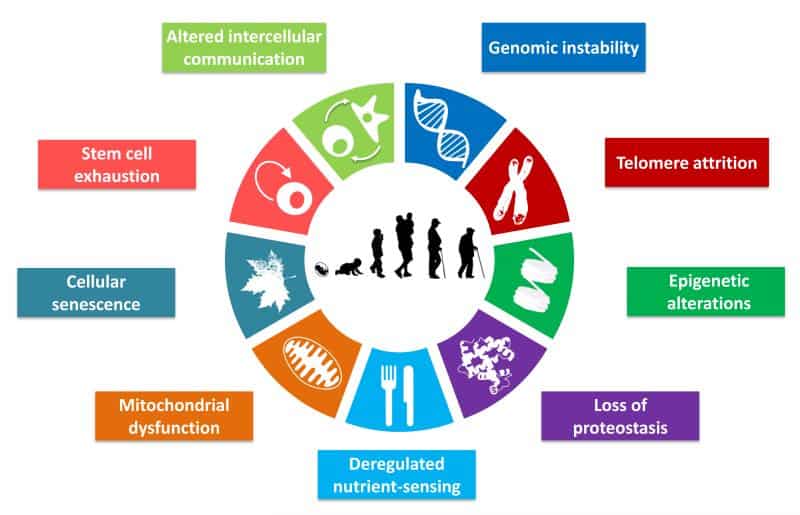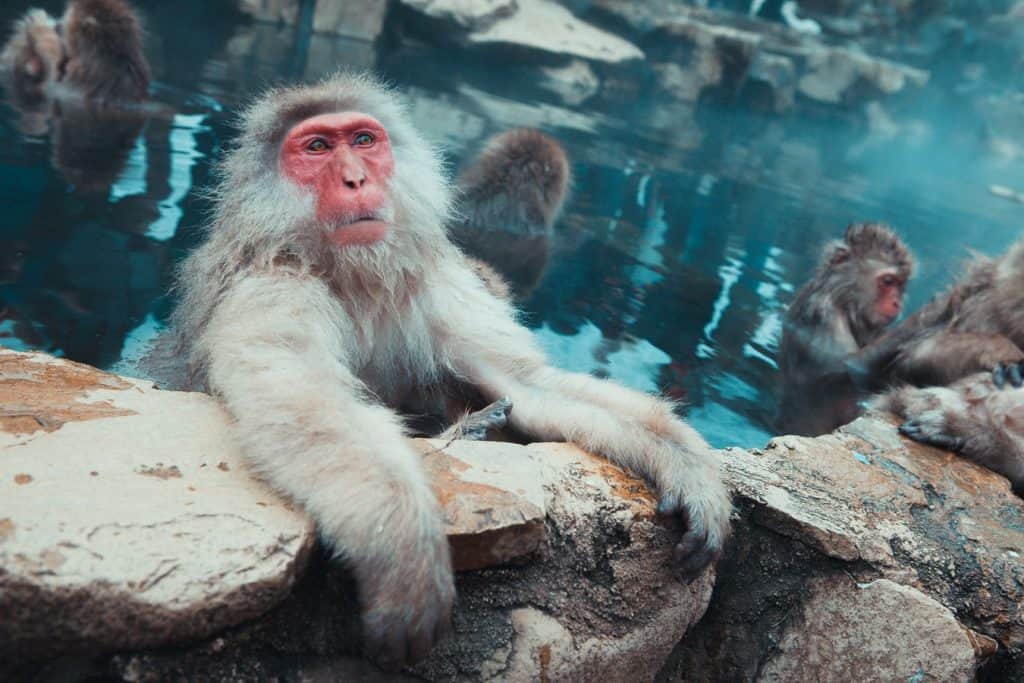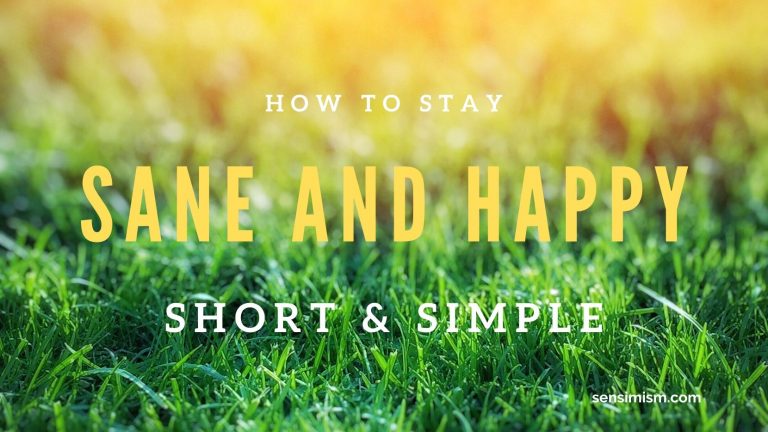How to live longer through 5 habits – latest research-backed information
Would you like to live longer, without any high-tech, futuristic nano-bot or chemical interventions to your body? It is no longer a science-fiction story, tantamount to an AI taking over the world. It is something you can influence yourself just by adopting a few good regular habits. Read on to find out which ones.
Controlled stress to your body is key
All the habits to extend your lifespan are based around the same proposition: Some stress to your body (cells) is good for you. It kicks off processes within your body, that extend the lifespan of your cells and hence: you.
What do we mean by stress?
We certainly don’t mean work-related stress :). It’s stress in various forms and meanings of the word – anything that makes your body work a little bit harder, makes your heart race or makes your body think it needs to preserve itself a bit more.
Most of us live in a cushty world – some less, others too much, but not many readers here will have to venture out every day to forage or hunt and at the same time run away from predators. Our daily hunt will involve maybe walking a kilometre to some restaurant or office deli. Our body is in a comfortable place, doesn’t have to work too hard and therefore fortify itself thus it fades away faster, simple as that.
Our air-conditioned environment, with transport options that don’t require our feed or much effort. We have warm clothing and heating, we only really run or do something more intense if we consciously decide to do exercise for an hour a day (or more likely even less).
So there you go – a body and brain that were designed to a daily level of some stress – walk/run a lot, live on irregular calorie intake, quite often less than what we’d like – is now put into warm clothing, an air-conditioned car and given a gazillion options on how to gorge on calories on every step of our daily routine. What could go wrong…
Our body doesn’t have to work that hard to get what it needs, it actually gets too much of what it needs and doesn’t need. Our cells have to struggle with a lack of movement and obesity but also they get damaged by a range of external factors we can’t influence much (UV radiation, cell reproduction through division). Mitigating these factors by making your body work harder (but wisely) is the key thing in extending your lifespan.
“because the little bit of stress that occurs when the genes are activated prompts the rest of the system to hunker down, to conserve, to survive a little longer. That’s the start of longevity.” (from “Lifespan: Why We Age-and Why We Don’t Have To” by David Sinclair, Matthew D. LaPlante)
Exposure to controlled stress is the easiest way how to make your body work harder, without any serious risks. Such controlled stress causes our body & cells to trigger built-in defences and repair mechanisms through something called longevity genes.
And what are the recommended stresses you can try out?
- cold exposure
- heat exposure
- calorie restriction / intermittent fasting, lower protein intake / OMAD (one meal a day)
- higher intensity exercise
What causes ageing?
To understand what we need to do to live longer, a good place to start might be the reason behind ageing. Not the reasons why people die eventually – like all the illnesses and diseases (cancer, obesity, cardiovascular diseases etc.) – they just happen more to an older & weaker organism. We want to know what makes an organism older and weaker in the first place.
The research & books
According to the National Institute of Health and their National Center for Biotechnology Information (NCBI) – it’s all down to various changes in our cells, how they work and communicate with each other. (this is a shameless simplification of all the issues – if you’re interested in the details, read their study “The Hallmarks of Ageing).
There are 9 main factors causing ageing:

Some of these findings are also confirmed in the “Longenity” or Longevity Genes Project by Albert Einstein College of Medicine research.
“The paradox is that our wonderful ability to adapt and grow doesn’t happen without stress—we can’t have the good without a bit of the bad.” (from “Spark: How exercise will improve the performance of your brain” by Dr John J. Ratey, Eric Hagerman, John Ratey)
A connection can be found in separate research by Dr John Ratey, summarised in his book “Spark: The Revolutionary New Science of Exercise and the Brain” into the connection between the brain’s performance and exercise, it’s role in the treatment of depression, ADHD or potential for optimising our ability to learn, remember, and perform.
But don’t worry – you don’t need to know any of them in any detail. Leave that to the scientists and their research. What we will focus on is their recommendations – what to implement into our daily routine that can positively influence/slow down the ageing process.
Professor David Sinclair’s book is a very good summary of his years of research into ageing: Lifespan – why we age and why we don’t have to. Amongst advice on how to slow down ageing, he also clarifies one important thing: we don’t want to just live longer. We want to live healthily longer. Lifespan vs healthspan.
Controlled stress #1 – Cold exposure
There’s a good chance you have heard this one already. Either through ages-old wisdom passed down generations – especially in the colder climates – exposure to cold is good for you.
More recently, this simple habit was popularised by the Wim Hof Method and studies investigating it here and here. (Note that the Wim Hof Method also incorporates controlled breathing that is adding to the benefits of cold exposure, but cold exposure (or ice bath, cold water immersion, cold therapy cryotherapy or simpler winter swimming) on its own has been practised for centuries – in various forms all over the world.
The idea is simple – spend a short amount of time regularly in cold water (or air), in a controlled and informed manner:
- know what you are doing – read what to do and not to do
- don’t overdo it (80/20 rule – shorter time, but regular is better than pushing yourself to the limit too much and risking your health – along the lines of sensimism too: gradual, smaller steps, over longer period of time)
- anything below 15 degrees Celsius (60 Fahrenheit) is good enough
- the simplest way is to just switch to a cold shower regularly – the water won’t be too cold, but it will bring most of the benefits
- and it doesn’t have to be specifically cold water – you can try various forms of cold exposure – wearing less in winter, mountain (snow) trekking topless or in shorts, or a good old snow angel… with no clothes on 😀
There are many reported health benefits of cold exposure, many still need more research and validation, but one thing is sure – this level of controlled stress through cold exposure makes your body & cells work harder (but not too hard), – which makes them more resilient, kicks off their self-preservation and repair processes, prolonging their and therefore your lifespan.
Controlled stress #2 – Heat exposure
This is the opposite side of the spectrum as cold exposure but brings many benefits too. Saunas (often combined with a cold dip) are very popular around the world (from South American Mayans – Temazcal to Nordic countries) and their benefits are discussed across many trustworthy platforms:
- Medical News Today – What are the benefits and risks of a sauna?
- Harvard Health: Sauna Health Benefits: Are saunas healthy or harmful?
- National Health Institute: Clinical Effects of Regular Dry Sauna Bathing: A Systematic Review
- Harvard Health: Sauna use linked to longer life, fewer fatal heart problems
- Science Daily: Frequent sauna bathing has many health benefits
Findings from this comprehensive literature review also suggest that the health benefits of sauna bathing are linked to the effects of sauna on circulatory, respiratory, cardiovascular, and immune functions. Regular sauna bathing stabilizes the autonomic nervous system, reduces blood pressure, inflammation, oxidative stress, circulation of bad cholesterol, arterial stiffness, and vascular resistance. Moreover, sauna bathing contributes to beneficial levels of circulating hormones and other cardiovascular markers.
— Science Daily

Interestingly – or more appropriately for this article, according to the same Science Daily article above: “The physiological responses produced by an ordinary sauna bath correspond to those produced by moderate- or high-intensity physical activity such as walking.” Meaning that sauna creates some stress on your body, comparable to moderate- or high-intensity physical activity. It doesn’t replace the exercise, of course, but it supplements it nicely.
In short – the benefits of controlled heat exposure, an example of which is a good old sauna, span various bodily functions, but most importantly influence your heart and blood circulation, immune system and cell health.
Controlled stress #3 – Calorie restriction / intermittent fasting / OMAD
Also gaining popularity in recent years is calorie restriction – aiming to reduce your daily caloric intake to slightly below your recommended values. These vary (depending on your level of physical activity) between 2000 – 2600 calories for women and 2200 – 3000 calories for men. They vary further based on your age, so make sure you research what’s best for you thoroughly. WebMD offers a good summary table to start with. You can either skip a single meal each day, or have one meal a day (OMAD), or you keep every meal, but eat 80% of what you would normally eat, or eat only during a shorter period every day (intermittent fasting).
Calorie restriction means reducing average daily caloric intake below what is typical or habitual, without malnutrition or deprivation of essential nutrients.
National Health Institute
The research behind caloric restriction indicates, that people or animals with lower caloric intake live longer. Here are some of the most often cited studies, involving animals or humans:
- Science Daily: Calorie restriction trial in humans suggests benefits for age-related disease
- National Health Institute: Calorie Restriction and Fasting Diets: What Do We Know?
Then there’s less scientific, but age-old wisdom of Confucius and his “Hara Hachi Bun Me” or “Eat until you are 80% full”. It has been practised in Japan, China or India for centuries and more recent studies also show longer lifespan in people practising this lifestyle.
Don’t confuse caloric restriction with intermittent fasting. You can restrict your caloric intake in many ways and intermittent fasting is one of the tools that make it easier. Amongst other, unexpected benefits of intermittent fasting, it’s key benefit is how easy it is to lower your caloric intake – just by eating during a certain window every day, then fast for the rest of the day. What works for most people is the 16/8 model, where you eat during 8 hours and fast for 16 hours every day. If you plan the 8 hours between say 9 in the morning and 5 in the afternoon, it doesn’t crash your daily routine too much.
Main benefit of intermittent fasting, mostly related to this article is that it is another form of controlled stress to your cells: it forces them to digest nutrients differently, more efficiently and kicks off further chemical processes that benefit your body.
Controlled stress #4 – Higher intensity exercise
Not much needs to be said here – Move people! It’s good for you! 😀
The best type of movement according to previously mentioned book Spark: The Revolutionary New Science of Exercise and the Brain is higher intensity exercise – whatever makes your heart race and gets you really out of breath. Cross-fit or HIIT jump to mind, but a good trek in the mountains or physical labour will achieve the same. Any activity where you start to sweat counts – so get out and do something!
TIP: Little time? Do as many burpees as you can, it’ll only take you max 5 minutes and your heart will definitely be racing!
And if you can’t do a high-intensity activity, even regular walking has many benefits.
If you have a sedentary job or work from home, here are some tips and tools to keep you moving!
And yes – the trick isn’t as much in the intensity, it’s in the frequency of the movement – keep it regular, move daily for best results.
Bonus: To make the most of these activities, do them sensimly:
That means gradually but regularly, over a long period of time. If you start too strong, you might burn out, if you do it irregularly, the benefits will be dampened. Learn from nature and apply some sensimism to it 🙂
Summary
Don’t protect yourself too much – from cold, heat or physical activity. Some stress is good for our body. Make sure it’s controlled and safe, but not too comfy. Make these habits part of your life:
- expose yourself to cold, in a controlled and safe matter – cold bath/shower or wearing less clothing in colder climates are good ways to start
- expose yourself to heat, in a controlled and safe matter – find a sauna in any spa nearby and you’re good. Mix it with a cold bath and you’re even better off
- eat a bit less, try intermittent fasting, stop snacking
- move as much as you can – walk everywhere you can, move when you work, and try to increase the intensity of the exercise, focus on cardio – getting your heart pumping
Simple things add up if done every day. Make them the good ones!
Sensimism.com
Photo by Brooke Lewis from Pexels | Photo by Jonathan Forage on Unsplash






